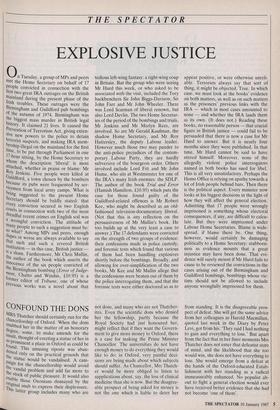THE SPECTATOR
EXPLOSIVE JUSTICE
On Tuesday, a group of MPs and peers met the Home Secretary on behalf of 17 people convicted in connection with the first two great IRA outrages on the British mainland during the present phase of the Irish troubles. These outrages were the Birmingham and Guildford pub bombings of the autumn of 1974. Birmingham was the biggest mass murder in British legal history. It claimed 21 lives. It caused the Prevention of Terrorism Act, giving exten- sive new powers to the police to detain terrorist suspects, and making IRA mem- bership illegal on the mainland for the first tune, to be put through Parliament in one 17-hour sitting, by the Home Secretary to whom the description 'liberal' is most attached, whether in praise or blame: Mr Roy Jenkins. Five people were killed at Guildford, a town chosen by the bombers because its pubs were frequented by ser- vicemen from local army camps. What is being suggested to the present Home Secretary should be baldly stated: that every conviction secured in two English courts in connection with two of the most dreadful recent crimes on English soil was a wrongful conviction. The attitude of many people to such a suggestion must be: SO what? Among MPs and peers, enough dupes or worse are always available to say that such and such a revered British institution — in this case, British justice _ is a sham. Furthermore, Mr Chris Mullin, the author of the book which asserts the Innocence of the six people convicted of the Birmingham bombing (Error of Judge- 'nem, Chatto and Windus, £10.95) is a former editor of Tribune, one of whose previous works was a novel about that tedious left-wing fantasy: a right-wing coup in Britain. But the group who were seeing Mr Hurd this week, or who asked to be associated with the visit, included the Tory backbenchers Sir John Biggs-Davison, Sir John Farr and Mr John Wheeler. There was Lord Scarman of liberal renown, but also Lord Devlin. The two Home Secretar- ies of the period of the bombings and trials, Mr Jenkins and Mr Merlyn Rees, are involved. So are Mr Gerald Kaufman, the shadow Home Secretary, and Mr Roy Hattersley, the deputy Labour leader. However much those two may pander to the anti-police prejudices of the contem- porary Labour Party, they are hardly subversive of the bourgeois order. Others involved include Lord Fitt and Mr John Hume, who sits at Westminster for one of the IRA's many Irish enemies: the SDLP. The author of the book Trial and Error (Hamish Hamilton, £10.95) which puts the case for those found guilty of the Guildford-related offences is Mr Robert Kee, who might be described as an old- fashioned television-documentary liberal. (Not that this is any reflection on the persuasiveness of Mr Mullin's book. He too builds up at the very least a case to answer.) The 17 defendants were convicted on the strength of two groups of evidence: their confessions made in police custody, and forensic tests which found that various of them had been handling explosives shortly before the bombings. Broadly, and allowing for over-simplification of the two books, Mr Kee and Mr Mullin allege that the confessions were beaten out of them by the police interrogating them, and that the forensic tests were either doctored so as to appear positive, or were otherwise unreli- able. Terrorists always say that sort of thing, it might be objected. True. In which case, we must look at the books' evidence on both matters, as well as on such matters as the prisoners' previous links with the IRA — which in most cases amounted to none — and whether the IRA lauds them as its own. (It does not.) Reading these books, no reasonable person — that crucial figure in British justice — could fail to be persuaded that there is now a case for Mr Hurd to answer. But it is nearly four months since they were published. In that time, Mr Hurd cannot be said to have stirred himself. Moreover, none of the allegedly violent police interrogators named in both books has sued for libel. This is all very unsatisfactory. Perhaps the Home Office is relying on apathy towards a lot of Irish people behind bars. Then there is the political aspect. Every minister now looks at his biggest decisions in the light of how they will affect the general election. Admitting that 17 people were wrongly imprisoned is something whose electoral consequences, if any, are difficult to calcu- late. But they were imprisoned under Labour Home Secretaries. Blame is wide- spread, if blame there be. One thing, however, would certainly be damaging politically to a Home Secretary: stubborn- ness as evidence mounts that a great injustice may have been done. That evi- dence will surely mount if Mr Hurd fails to cause to be reviewed the convictions in the cases arising out of the Birmingham and Guildford bombings, bombings whose vic- tims should not be allowed to include anyone wrongfully imprisoned for them.










































 Previous page
Previous page